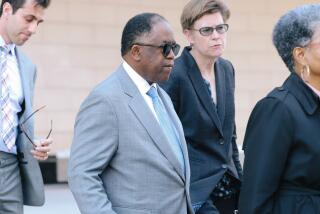Federal Judge Says Milken Is ‘Unworthy of Belief ‘ as a Witness
- Share via
NEW YORK — He’s completed a prison term. He’s entered academia. He’s hoping to reclaim respectability. But Michael Milken remains “unworthy of belief,” a federal judge declared Wednesday.
U.S. District Judge Milton Pollack reached that conclusion in deciding a Securities and Exchange Commission lawsuit against two other leading figures in the financial scandals of the 1980s: corporate raiders Victor and Steven Posner.
The case was the first to pit live testimony from Milken, the former junk bond king, against that of his onetime business associate Ivan F. Boesky, like Milken a convicted white-collar criminal.
“As a witness, Boesky presented a striking contrast to Milken,” Pollack said in his written ruling. While Boesky was credible and direct, he said, Milken’s “responses were unworthy of belief, contradictory and internally inconsistent.”
As for the Posners, Pollack said he will impose unprecedentedly harsh civil penalties on the father and son, permanently barring them from serving as officers or directors of any public company. He said he will also order them to disgorge $3.8 million in ill-gotten profits.
The Posners’ lawyer, Dennis J. Block, said, “We believe the judge’s opinion has no basis in either fact or law, and we intend to appeal it expeditiously.”
Milken--now teaching a class in finance at UCLA after completing a federal sentence for securities fraud--took umbrage at being declared a liar.
“I would simply like to reaffirm that my testimony was truthful in all respects,” Milken said in a written statement.
The former chief of Drexel Burnham Lambert’s junk bond operation said that because he was only a witness in the trial, and not a party, he was not allowed to present evidence supporting his version of events.
Boesky, a leading speculator in takeover stocks in the 1980s, was a business associate of Milken and later became his nemesis. After pleading guilty to insider trading, Boesky gave investigators information that led to Milken’s prosecution and subsequent guilty plea in 1990 to six counts of securities fraud.
UCLA has been widely criticized for allowing a convicted white-collar felon to teach a finance course. Carol Scott, associate dean of the university’s John E. Anderson Graduate School of Management, said Wednesday that she had no comment on Pollack’s assessment of Milken.
The SEC suit, which came to trial in Manhattan federal court last spring, accused the Posners of conspiring with Milken to have Boesky illegally “park” stock in Fischbach Corp., an electrical and mechanical contractor. The alleged purpose was to help the Posners amass Fischbach stock in preparation for a takeover.
Pollack said Boesky clearly and believably testified that the only reason he bought the Fischbach stock was to aid the illegal Milken-Posner scheme. But during the trial, Pollack ruled, “Milken sought to exploit every ambiguity and hole in his prior statements to cast his conduct in an innocent light.”
Pollack said strong action was warranted against the Posners because they had flouted two earlier SEC injunctions forbidding them to violate securities laws.
More to Read
Sign up for Essential California
The most important California stories and recommendations in your inbox every morning.
You may occasionally receive promotional content from the Los Angeles Times.













